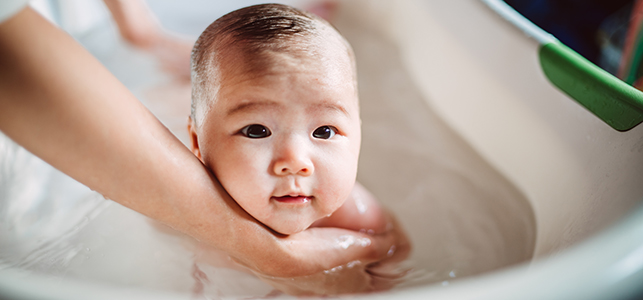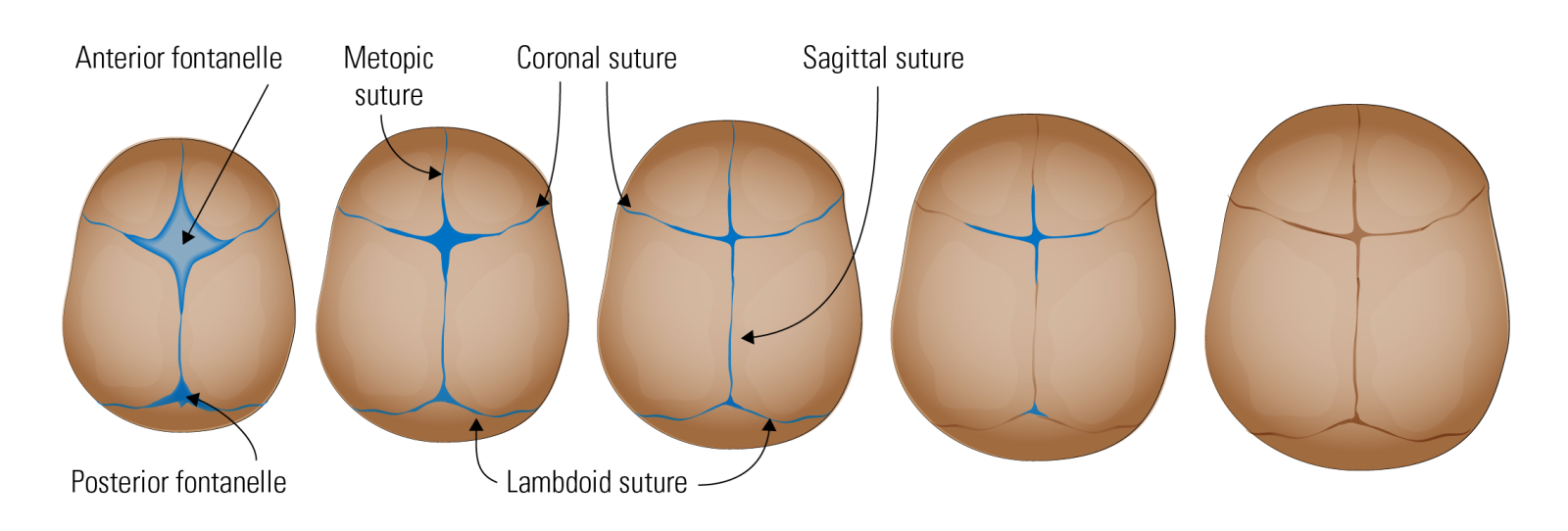
Did you know that infants’ skulls are made up of several bones? They’re joined together by fibrous material called sutures. These sutures intersect in two distinct areas on the head forming ‘soft spots’ that go away as the bones fuse together and baby’s head grows. Perhaps even more fascinating are the reason for the soft spots and the clues they can provide about your baby’s health.
Pediatric neurosurgeon Dr. Jessica Lane explains the soft spots on babies’ heads
What is a fontanelle?
A fontanelle is a soft spot on a baby’s head. There’s one on the back of the head (called the posterior fontanelle) and one on the top front portion of the head (called the anterior fontanelle). These are areas are where multiple sutures meet, like roads coming together at an intersection.

Why do babies have sutures and fontanelles?
Sutures allow the skull bones to move and overlap for flexibility during childbirth. They also accommodate for the rapid growth of baby’s head and brain in the early months of life.
Do I have to be extra careful about my baby’s fontanelles?
The brain is still protected by a thick membrane layer, but it’s not nearly as strong as bone. Soft touching, like when washing baby’s head and hair at bath time, is okay but you want to avoid firmer pressure or bumps. Supporting the head and neck when holding or carrying your baby will help with this.
When do the fontanelles close?
The posterior fontanelle is the smaller of the two and usually closes by the time baby is about 3 months old. The larger anterior fontanelle typically closes between 9 and 18 months. There can be considerable variation in when the fontanelles close, and they may feel closed when they are just small or closely opposed (edges close together, like tiles without grout).
What other cues can the fontanelles provide about my baby’s health?
If you gently rub your baby’s head, you’ll likely feel the soft, flat spots. You may even feel pulsing which is the result of the heart pumping blood through the body. All of this is normal. Your baby’s pediatrician will examine the soft spots during regular well visits to make sure they appear to be closing appropriately. They’ll also keep an eye on the head’s overall shape and size as they track your baby’s growth.
When it comes to the fontanelles, the pediatrician will be looking for:
- A sunken soft spot, which can be a sign of dehydration. Other indicators that dehydration may be a concern include poor feeding, fewer wet diapers, vomiting/diarrhea or being less alert than usual.
- A bulging soft spot, which could indicate infection, fluid buildup or bleeding. While these situations are serious and should be assessed quickly, they are rare.
Sometimes bulging fontanelles can temporarily be caused by crying or being in a lying position. If you notice the swelling during other times, have it checked out by a medical professional right away.
What if the fontanelles close earlier or later than expected?
Most often, this is nothing to worry about, but sometimes an absent or early closing fontanelle can be a sign of craniosynostosis, an abnormality in the sutures of the skull that can lead to difference in head shape and limit the ability to grow. Your child’s pediatrician may refer you to a neurosurgeon or craniofacial specialist to determine if surgery is needed to open the bones and reshape the skull.
An enlarged anterior fontanelle and delayed closure may signal that the pressure inside the skull is high. This may also prompt referral to a neurosurgeon for further evaluation.
Having a new baby can come with a lot to think – and worry – about! Enjoy the sweet snuggles and coos and remember that if you have any questions or concerns, there are experts at the ready to provide guidance and care for your family.
